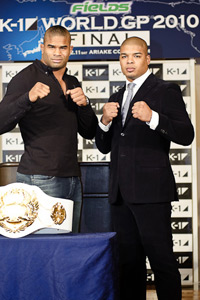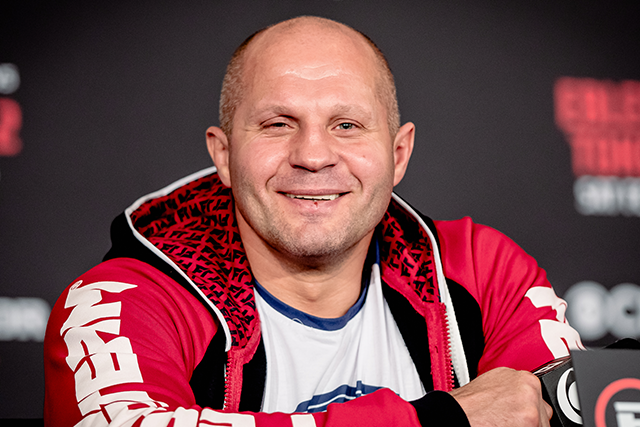Alistair Overeem and Japan’s Icon Architecture
Obvious Example
Tony Loiseleur Dec 30, 2010

Alistair Overeem | Paul Benjamin/Sherdog.com
TOKYO -- MMA fans and media constantly argue over whether a particular athlete is a “Top 10” fighter. Alistair Overeem is no exception to this rule. In fact, he’s the most obvious example.
The public perception of Overeem is complicated by his infrequent defending of his Strikeforce heavyweight title and frequent participation in K-1. He has been accused of evading his responsibilities as Strikeforce’s heavyweight champion and disregarding the North American MMA ideal: three fights a year, against top challengers, all while building a legacy.
Advertisement
To explain it, I would have to talk to the man himself, a task that proves difficult. I had been in pursuit of Overeem for the better part of a month for this piece. Before meeting him at the K-1 World Grand Prix 2010 press conference, I had not had any contact with the Dutchman, simply because of how insulated his inner circle kept him.
MMA is still widely praised for having the most accessible star
athletes in the world, a sport where any UFC fan can stake out the
fighter hotel on fight night and meet his or her heroes. However,
Overeem avoids many of the outrageous personal and media demands
heaped upon fighters through his entourage. Two of its principals
-- and Overeem’s closest liaisons -- are Eldar Gross and Remco
Peperkamp.
Peperkamp is charismatic. Perpetually smiling and naturally easy going, he’s gifted with an aura of geniality. He makes you feel as if you have known him for years. Peperkamp has been Overem’s best friend since childhood and, as a result, makes the perfect right-hand man. Much in the same way that NBA stars use their closest confidantes to coordinate, Peperkamp is an expert at feeling out and handling potential distractions for Overeem during training and while abroad.
Gross is Overeem’s documentarian, the man behind the wildly successful online documentary series “The Reem,” which has served a vital role in reinforcing the recent buzz surrounding Overeem. Thin, with curly dark hair and a perpetual five o’clock shadow, he has the look of an auteur.
Asking him a question about Overeem or filmmaking -- the two subjects about which he is incredibly passionate -- launches him into an intense treatise of an answer.

P. Benjamin
Overeem (above, left) won the K-1 GP.
Two days before K-1, all promotional activities are throttled to a trickle of interviews, most at the behest of K-1’s World Grand Prix broadcaster, Fuji TV. Making an exception for K-1’s television partners is par for the course, but discussion of the matter is a stark reminder of the state of kakutogi in Japan.
“K-1 has declining viewers. There are guys who have been champion three, four times. They need a new poster boy, and Alistair is a fresh new face [that] might attract a new kind of viewer,” says Gross. “I talked to [Fuji TV interpreter Russell Goodall], and he said that the things they’re doing now they’ve never done before: the variety shows, the daytime TV, interviews with ladies magazines, newspapers -- things that are normally not done with K-1 just to put the name out there to a new audience because they need it.”
Cognizant that his wide exposure on Japanese television will help boost awareness in himself and K-1, Overeem and company are shrewd enough to recognize what it means for his bottom line.
“He sees it as a step in his career, and, in the end, it’s about making money and there’s money to be made here. The bigger the exposure and the bigger the fanbase, the more money he receives, so he sees it as part of his job,” says Gross.
Having experienced an impoverished youth, Overeem realizes he only has so long in the fight business to make the millions he can use to provide for his family and, later, comfortably retire.
“I know what it’s like to be poor [living with] my grandmother. I know what it’s like to have no money. I know what it’s like to be in debt. I know what it’s like to make money, to get out of debt. It’s been a long process, and you have to be careful about these things. These are the years that you can make money, so do it while you can and don’t spend too much,” Overeem says over dinner.
Critically, Overeem actually enjoys the spotlight and does not seem to tire of it, as many celebrities inevitably do.
“The thing is I do like Japanese television. It doesn’t make any sense at all to me, and it’s kinda funny. The humor level is the same, and I’m having fun,” he says with a smile.
Cultural allure is the simplest reason why Overeem remains adamant about spending the best years of his career in Japan and K-1 rather than exclusively fighting MMA stateside.
On top of Overeem’s fascination with Japanese pop culture, K-1 stars are infinitely more revered in his native Netherlands, and by fighting K-1 and MMA, his chances for frequent fights and paydays are much greater. Exclusively fighting for Strikeforce or the UFC, he would be looking at three fights a year at most. By fighting K-1 and MMA together, he can easily double that.
Though he does not say so himself, Overeem wants to be in the Octagon someday, according to members from his entourage. However, that time simply is not now. The present is all about building his star and his bank account, and Japan is still the best place to do that.
Getting ‘The Beast’ Treatment
Goodall is an exuberant and engaging man with a long history in the Japanese TV world and Fuji TV. He looks a lot like Hugh Laurie, but his gifts lie in television production and interpretation rather than acting, piano and diagnostic medicine.
The son of Christian missionaries from New Zealand, Goodall has lived in Japan since he was a few months old and thus speaks Japanese like a native. It is quite a sight to see Dr. Gregory House speaking and joking around in Japanese the way that only your average “Taro” does.
“
The biggest thing that
Fuji TV knows is that
Alistair is clever and
can learn.
”
The media process in building Overeem for the Japanese audience mirrors this experience. As a homogenous and insular culture, foreign celebrities -- foreigners, in general -- are often viewed as aloof, inaccessible and consequently alien. Fuji TV’s simple plan in promoting Overeem attempts to overcome this typical reaction by putting him into silly game shows and comedy variety shows.
“The biggest thing that Fuji TV knows is that Alistair is clever and can learn,” Goodall says. “He knows how to play along with the variety shows because that’s a big part of [Japanese] TV culture. Funny is good. Funny is accessible. Oh, this guy can do funny? He’s more human. Alistair can come down to a show, take his shirt off and pick six girls up and be funny.”
Related Articles








